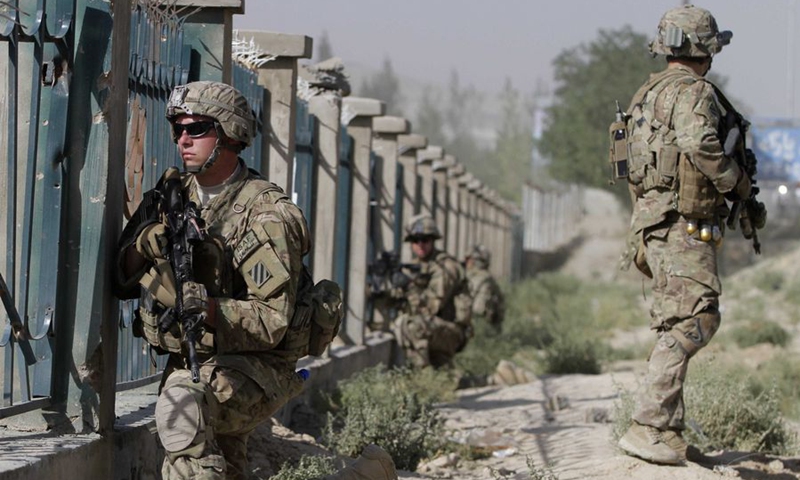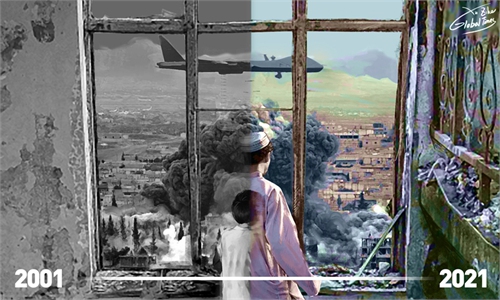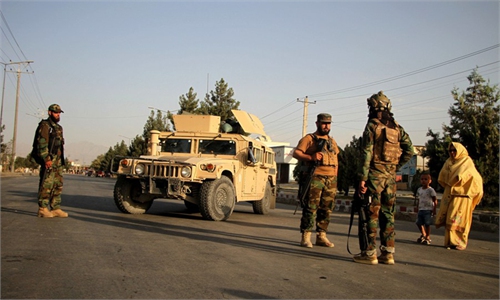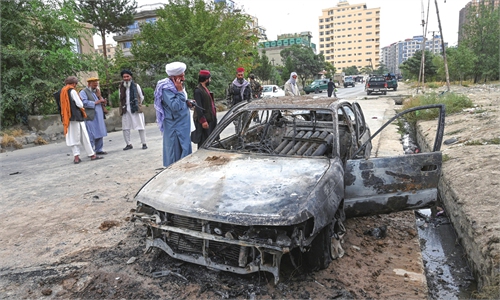IN-DEPTH / IN-DEPTH
American veterans feel guilty as evacuation deadline arrives: Taliban trained in US' fight against them

Photo taken on September 8, 2013, shows American soldiers patrol in Afghanistan. Photo: Xinhua
The looming withdrawal deadline further complicates the recent rollercoaster of feelings among US veterans who served in occupying Afghanistan. Their long-awaited "end time" is at hand, but as the Taliban quickly seized their opportunity in all directions, when the US troops are departing in an ignominy they could never have imagined.
The Taliban's return to power, ISIS bomb attacks, the US government's hasty airstrikes and the withdrawal of troops... amid the chaos in Afghanistan, many US veterans who have returned home find it difficult to revisit their time in the military in a land that seems far away for most Americans. Nor can they discuss without difficulty the future of the country where they fought so hard against terrorism.
"This is part of going to war, but one isn't truly prepared for it until it happens," Adrian Bonenberger, who served on two tours of Afghanistan between 2007 and 2011, wrote on Facebook.
In an interview with the Global Times, Bonenberger said that most US veterans of Afghanistan felt relief to see the end of the war.
"I'm happy about the withdrawal. I do not think one country should indefinitely dictate the future of another country. But I'm unhappy that the US has been slow to help Afghan allies. We should have done more to help the people who worked for us," Bonenberger said.
No one could have imagined that an English literature major who graduated from Yale and actively protested against the Bush administration's war in Iraq in 2003 would have joined the army just a few years later, even becoming a commander in charge of 150 soldiers and responsible for the security of the huge Imam Sahib District near the border with Tajikistan.
"It was always very unstable. Afghanistan has been unstable since the 1970s, when the USSR started meddling. The USA further destabilized things in the 1980s in their competition with the USSR. For the past 20 years, we tried to make it more stable, and failed," Bonenberger said.
Bonenberger once had a banner on his desk reading "For God, for Country, and for Yale" which one of his soldiers described as "the dark relish of mayhem" in Bonenberger's eyes, the Yale Alumni Magazine reported in 2010, when the war in Afghanistan had become unwieldy. At the time, Bonenberger told himself he needed to anticipate every potential danger possible in every operation, from heat exposure to suicide bombs. "I'm getting pretty tired of seeing dead bodies, that's for sure."
He believes that the US has been attempting to stabilize Afghanistan through aid projects and training their security forces. However, "it was also, in fighting against the Taliban, training the Taliban to be a very effective insurgency."
Since the September 11 attacks in 2001, about 800,000 Americans have served in the war in Afghanistan. Of those, 2,352 have been killed and more than 20,000 wounded, according to media reports.
Over the past 20 years, Afghanistan has been stuck in misery. The war has not only killed at least 100,000 civilians but has also left the country with difficulties in rebuilding its economy and political system.
In his first few years of service, Bonenberger fell into a constant emotional depression. He has written several books reflecting on his experiences in Afghanistan. The latest is The Disappointed Soldier and Other Stories from War, a collection of short stories that draw on his two tours.
"Veterans from every army share an important bond, which is the knowledge that bullets and bombs do not have an ideology, and do not care about the families or hopes and dreams of the people they hurt or kill," Bonenberger replied when asked why he used the word "disappointed" to describe soldiers.
Complex sense of shame
For nearly half a month, San Francisco resident Michael (pseudonym), who served as an intelligence analyst for the US Marines Corps in Afghanistan in 2011-2012, watched the Taliban return to Kabul with a mix of sadness, anger and loss, seeing them "sweep away 20 years of US' accumulation."
Michael requested anonymity due to concerns that his interview with a Chinese media outlet would be recorded in some way by some US departments that would affect his family's work in the government.
In stark contrast to the decorated warriors, for years, Michael had been skeptical of this costly war. At one time, like most American soldiers, Michael left home with the vengeful goal of wiping out al-Qaeda's leader Osama bin Laden and the Taliban in one fell swoop, only to find out once there that the mission they had undertaken had nothing to do with it.
"Back then, many people wanted to quit, because we realized that the commanders in the Pentagon didn't have a thoughtful and visionary plan or even a clear vision of the country they were occupying, and that we, the desperate soldiers on the front lines, were already distracted just by trying to deal with the chaos in front of us to make sure our families didn't wake up to bad news," Michael told the Global Times.
As for the Afghan people, Michael said the war in Afghanistan has been a total disaster for them. "At that time, we would treat the locals with compassion, but those behind us [at the top of the US government] who raised the humanitarian flag never cared about them," he said. "We worked with the hypocritical and insular Afghan government but never trusted them, just allowed them to ultimately crumble from the inside out, leaving behind a mess that will take decades to regain its vitality."
To this day, Michael still often visits local Afghan restaurants in the US in search of familiar flavors. He said that having been in contact with Afghans for the purpose of intelligence gathering in the past, after leaving the battlefield he can talk to them in a relatively sincere manner.
"But now, seeing them, I feel guilty again," Michael sighed.
What happens next?
According to the US news site The Daily Beast, facing the chaotic situation, US veterans experienced varying degrees of mood swings and mental health problems. The number of calls to the US Veterans' Suicide Hotlines had spiked.
When Michael again heard the sound of shelling in Kabul that killed 13 US service members last week and saw one veteran after another calling for the responsible withdrawal of Western troops instead of leaving Afghan interpreters, translators and support personnel who spent years working with the US at risk to themselves and their families, he also had the idea of picking up the phone to seek psychological counseling.
Michael has no idea what lies ahead for the US troops still stranded in Afghanistan, nor can he imagine the future of the local population.
"That majority clearly feels the Taliban are the group that can provide security and stability. I don't know that they're right, but it's not my country, it's their country," Bonenberger said.
Bonenberger noted that when watching the Taliban take Kabul without a shot, he realized more Afghan people wanted the Taliban in charge than the government. "Twenty years of corruption, indifference and stealing, culminating in the abdication of President Ghani left a majority of the Afghans looking for security and stability."
"The Afghans are a proud and capable people, and this war is theirs; it must become theirs, it cannot continue to be ours," Bonenberger said. The Afghan people are not subplots in America's grand story - they're the protagonists of their own story, he said.



